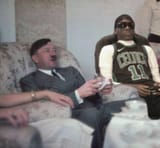Anonymous
ID: kr7XcTPn
7/11/2025, 3:46:08 AM No.510059846
> “I am not ashamed to say that, carried away by the enthusiasm of the moment, I sank down on my knees and thanked Heaven from an overflowing heart for granting me the good fortune of being permitted to live at this time.”
(Mein Kampf, Volume 1, Chapter 5)
> “The more I saw of the front lines, the more I learned to love the common soldier. And at the same time I grew increasingly embittered against those vile creatures who dodged their duty at home, against the despicable money-grubbers and political rabble-rousers.”
(Mein Kampf, Volume 1, Chapter 6)
> “The German people did not bear the war; at the front they bore every burden, but at home there was cowardly shirking, selfishness, and treason.”
(Mein Kampf, Volume 1, Chapter 6)
> “In the days of the collapse I was ripe for joining the ranks of the revolutionaries; but after a few days I saw through this whole infamous betrayal of the people. It was all a lie, a fraud, a monstrous fraud.”
> “I was determined to become a politician.”
(Mein Kampf, Volume 1, Chapter 7)
> “The more I tried to bring to my fellow soldiers a clear understanding of the inner meaning of this collapse, the more familiar I became with the word ‘Jew.’”
(Mein Kampf, Volume 1, Chapter 8)
> “It needed the whole bottomless falsehood of the Jew and his Marxist fighting organization to lay the blame for the collapse exactly on the man who alone had fought against this enemy of mankind with ultimate consequence.”
(Mein Kampf, Volume 1, Chapter 10)
> “The German army was still almost entirely intact and undefeated. It had to be broken by means of the cowardice of the home front.”
(Mein Kampf, Volume 1, Chapter 10)
> “A revolution of heroes is conceivable only in the name of a national ideal, not for the achievement of selfish goals and gratification of base passions. But in November 1918 the betrayers of the German nation emerged from their rat holes.”
(Mein Kampf, Volume 1, Chapter 10)
(Mein Kampf, Volume 1, Chapter 5)
> “The more I saw of the front lines, the more I learned to love the common soldier. And at the same time I grew increasingly embittered against those vile creatures who dodged their duty at home, against the despicable money-grubbers and political rabble-rousers.”
(Mein Kampf, Volume 1, Chapter 6)
> “The German people did not bear the war; at the front they bore every burden, but at home there was cowardly shirking, selfishness, and treason.”
(Mein Kampf, Volume 1, Chapter 6)
> “In the days of the collapse I was ripe for joining the ranks of the revolutionaries; but after a few days I saw through this whole infamous betrayal of the people. It was all a lie, a fraud, a monstrous fraud.”
> “I was determined to become a politician.”
(Mein Kampf, Volume 1, Chapter 7)
> “The more I tried to bring to my fellow soldiers a clear understanding of the inner meaning of this collapse, the more familiar I became with the word ‘Jew.’”
(Mein Kampf, Volume 1, Chapter 8)
> “It needed the whole bottomless falsehood of the Jew and his Marxist fighting organization to lay the blame for the collapse exactly on the man who alone had fought against this enemy of mankind with ultimate consequence.”
(Mein Kampf, Volume 1, Chapter 10)
> “The German army was still almost entirely intact and undefeated. It had to be broken by means of the cowardice of the home front.”
(Mein Kampf, Volume 1, Chapter 10)
> “A revolution of heroes is conceivable only in the name of a national ideal, not for the achievement of selfish goals and gratification of base passions. But in November 1918 the betrayers of the German nation emerged from their rat holes.”
(Mein Kampf, Volume 1, Chapter 10)
Replies:

